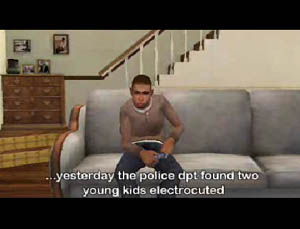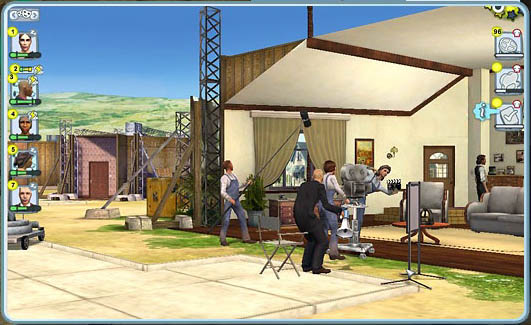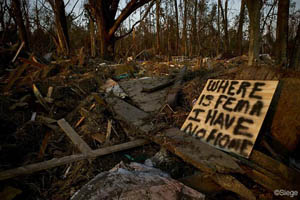
Open Source’s hour on the Googlization of libraries was refreshingly light on the copyright issue and heavier on questions about research, reading, the value of libraries, and the public interest. With its book-scanning project, Google is a private company taking on the responsibilities of a public utility, and Siva Vaidhyanathan came down hard on one of the company’s chief legal reps for the mystery shrouding their operations (scanning technology, algorithms and ranking system are all kept secret). The rep reasonably replied that Google is not the only digitization project in town and that none of its library partnerships are exclusive. But most of his points were pretty obvious PR boilerplate about Google’s altruism and gosh darn love of books. Hearing the counsel’s slick defense, your gut tells you it’s right to be suspicious of Google and to keep demanding more transparency, clearer privacy standards and so on. If we’re going to let this much information come into the hands of one corporation, we need to be very active watchdogs.
Our friend Karen Schneider then joined the fray and as usual brought her sage librarian’s perspective. She’s thrilled by the possibilities of Google Book Search, seeing as it solves the fundamental problem of library science: that you can only search the metadata, not the texts themselves. But her enthusiasm is tempered by concerns about privatization similar to Siva’s and a conviction that a research service like Google can never replace good librarianship and good physical libraries. She also took issue with the fact that Book Search doesn’t link to other library-related search services like Open Worldcat. She has her own wrap-up of the show on her blog.
Rounding out the discussion was Matthew G. Kirschenbaum, a cybertext studies blogger and professor of english at the University of Maryland. Kirschenbaum addressed the question of how Google, and the web in general, might be changing, possibly eroding, our reading practices. He nicely put the question in perspective, suggesting that scattershot, inter-textual, “snippety” reading is in fact the older kind of reading, and that the idea of sustained, deeply immersed involvement with a single text is largely a romantic notion tied to the rise of the novel in the 18th century.
A satisfying hour, all in all, of the sort we should be having more often. It was fun brainstorming with Brendan Greeley, the Open Source on “blogger-in-chief,” on how to put the show together. Their whole bit about reaching out to the blogosphere for ideas and inspiration isn’t just talk. They put their money where their mouth is. I’ll link to the podcast when it becomes available.
image: Real Gabinete Português de Literatura, Rio de Janeiro – Claudio Lara via Flickr
Author Archives: ben vershbow
thinking about google books: tonight at 7 on radio open source
While visiting the Experimental Television Center in upstate New York this past weekend, Lisa found a wonderful relic in a used book shop in Owego, NY — a small, leatherbound volume from 1962 entitled “Computers,” which IBM used to give out as a complimentary item. An introductory note on the opening page reads:
The machines do not think — but they are one of the greatest aids to the men who do think ever invented! Calculations which would take men thousands of hours — sometimes thousands of years — to perform can be handled in moments, freeing scientists, technicians, engineers, businessmen, and strategists to think about using the results.
This echoes Vannevar Bush’s seminal 1945 essay on computing and networked knowledge, “As We May Think”, which more or less prefigured the internet, web search, and now, the migration of print libraries to the world wide web. Google Book Search opens up fantastic possibilities for research and accessibility, enabling readers to find in seconds what before might have taken them hours, days or weeks. Yet it also promises to transform the very way we conceive of books and libraries, shaking the foundations of major institutions. Will making books searchable online give us more time to think about the results of our research, or will it change the entire way we think? By putting whole books online do we begin the steady process of disintegrating the idea of the book as a bounded whole and not just a sequence of text in a massive database?
The debate thus far has focused too much on the legal ramifications — helped in part by a couple of high-profile lawsuits from authors and publishers — failing to take into consideration the larger cognitive, cultural and institutional questions. Those questions will hopefully be given ample air time tonight on Radio Open Source.
Tune in at 7pm ET on local public radio or stream live over the web. The show will also be available later in the week as a podcast.
IT IN place: muybridge meets typographic man


Alex Itin, friend and former institute artist-in-residence, continues to reinvent the blog as an art form over at IT IN place. Lately, Alex has been experimenting with that much-maligned motif of the early web, the animated GIF. Above: “My Bridge of Words.”
machinima’s new wave

“The French Democracy” (also here) is a short film about the Paris riots made entirely inside of a computer game. The game, developed by Peter Molyneux‘s Lionhead Productions and called simply “The Movies,” throws players into the shark pool of Hollywood where they get to manage a studio, tangle with investors, hire and fire actors, and of course, produce and distribute movies. The interesting thing is that the movie-making element has taken on a life of its own as films produced inside the game have circulated through the web as free-standing works, generating their own little communities and fan bases.
This is a fascinating development in the brief history of Machinima, or “machine cinema,” a genre of films created inside the engines of popular video game like Halo and The Sims. Basically, you record your game play through a video out feed, edit the footage, and add music and voiceovers, ending up with a totally independent film, often in funny or surreal opposition to the nature of the original game. Bob, for instance, appeared in a Machinima talk show called This Spartan Life, where they talk about art, design and philosophy in the bizarre, apocalyptic landscapes of the Halo game series.
The difference here is that while Machinima is typically made by “hacking” the game engine, “The Movies” provides a dedicated tool kit for making video game-derived films. At the moment, it’s fairly primitive, and “The French Democracy” is not as smooth as other Machinima films that have painstakingly fitted voice and sound to create a seamless riff on the game world. The filmmaker is trying to do a lot with a very restricted set of motifs, unable to add his/her own soundtrack and voices, and having only the basic menu of locales, characters, and audio. The final product can feel rather disjointed, a grab bag of film clichés unevenly stitched together into a story. The dialogue comes only in subtitles that move a little too rapidly, Paris looks suspiciously like Manhattan, and the suburbs, with their split-level houses, are unmistakably American.
But the creative effort here is still quite astonishing. You feel you are seeing something in embryo that will eventually come into its own as a full-fledged art form. Already, “The Movies” online community is developing plug-ins for new props, characters, environments and sound. We can assume that the suite of tools, in this game and elsewhere, will only continue to improve until budding auteurs really do have a full virtual film studio at their disposal.

It’s important to note that, according to the game’s end-user license agreement, all movies made in “The Movies” are effectively owned by Activision, the game’s publisher. Filmmakers, then, can aspire to nothing more than pro-bono promotional work for the parent game. So for a truly independent form to emerge, there needs to be some sort of open-source machinima studio where raw game world material is submitted by a community for the express purpose of remixing. You get all the fantastic puppetry of the genre but with no strings attached.
insidious tactic #348: charge for web speed
An article in yesterday’s Washington Post — “Executive Wants to Charge for Web Speed” — brings us back to the question of pipes and the future of the internet.  The chief technology officer for Bell South says telecoms and cable companies ought to be allowed to offer priority deals to individual sites, charging them extra for faster connections. The Post:
The chief technology officer for Bell South says telecoms and cable companies ought to be allowed to offer priority deals to individual sites, charging them extra for faster connections. The Post:
Several big technology firms and public interest groups say that approach would enshrine Internet access providers as online toll booths, favoring certain content and shutting out small companies trying to compete with their offerings.
Among these “big technology firms” are Google, Yahoo!, Amazon and eBay, all of whom have pressed the FCC for strong “network neutrality” provisions in the latest round of updates to the 1996 Telecommunications Act. These would forbid discrimination by internet providers against certain kinds of content and services (i.e. the little guys). BellSouth claims to support the provisions, though the statements of its tech officer suggest otherwise.
Turning speed into a bargaining chip will undoubtedly privilege the richer, more powerful companies and stifle competition — hardly a net-neutral scenario. They claim it’s no different from an airline offering business class — it doesn’t prevent folks from riding coach and reaching their destination. But we all know how cramped and awful coach is. The truth is that the service providers discriminate against everyone on the web. We’re all just freeloaders leeching off their pipes. The only thing that separates Google from the lady blogging about her cat is how much money they can potentially pay for pipe rental. That’s where the “priorities” come in.
Moreover, the web is on its way to merging with cable television, and this, in turn, will increase the demand for faster connections that can handle heavy traffic. So “priority” status with the broadband providers will come at an ever increasing premium. That’s their ideal business model, allowing them to charge the highest tolls for the use of their infrastructure. That’s why the telecos and cablecos want to ensure, through speed-baiting and other screw-tightening tactics, that the net transforms from a messy democratic commons into a streamlined broadcast medium. Alternative media, video blogging, local video artists? These will not be “priorities” in the new internet. Maximum profit for pipe-holders will mean minimum diversity and a one-way web for us.
In a Business Week interview last month, SBC Telecommunications CEO Edward Whitacre expressed what seemed almost like a lust for revenge. Asked, “How concerned are you about Internet upstarts like Google, MSN, Vonage, and others?” he replied:
How do you think they’re going to get to customers? Through a broadband pipe. Cable companies have them. We have them. Now what they would like to do is use my pipes free, but I ain’t going to let them do that because we have spent this capital and we have to have a return on it. So there’s going to have to be some mechanism for these people who use these pipes to pay for the portion they’re using. Why should they be allowed to use my pipes?
The Internet can’t be free in that sense, because we and the cable companies have made an investment and for a Google or Yahoo! or Vonage or anybody to expect to use these pipes [for] free is nuts!
This makes me worry that discussions about “network neutrality” overlook a more fundamental problem: lack of competition. “That’s the voice of someone who doesn’t think he has any competitors,” says Susan Crawford, a cyberlaw and intellectual property professor at Cardozo Law School who blogs eloquently on these issues. She believes the strategy to promote network neutrality will ultimately fail because it accepts a status quo in which a handful of broadband monopolies dominate the market. “We need to find higher ground,” she says.
I think the real fight should be over rights of way and platform competition. There’s a clear lack of competition in the last mile — that’s where choice has to exist, and it doesn’t now. Even the FCC’s own figures reveal that cable modem and DSL providers are responsible for 98% of broadband access in the U.S., and two doesn’t make a pool. If the FCC is getting in the way of cross-platform competition, we need to fix that. In a sense, we need to look down — at the relationship between the provider and the customer — rather than up at the relationship between the provider and the bits it agrees to carry or block…
…Competition in the market for pipes has to be the issue to focus on, not the neutrality of those pipes once they have been installed. We’ll always lose when our argument sounds like asking a regulator to shape the business model of particular companies.
The broadband monopolies have their priorities figured out. Do we?
image: “explosion” (reminded me of fiber optic cable) by The Baboon, via Flickr
google print on deck at radio open source
Open Source, the excellent public radio program (not to be confused with “Open Source Media”) that taps into the blogosphere to generate its shows, has been chatting with me about putting together an hour on the Google library project. Open Source is a unique hybrid, drawing on the best qualities of the blogosphere — community, transparency, collective wisdom — to produce an otherwise traditional program of smart talk radio. As host Christopher Lydon puts it, the show is “fused at the brain stem with the world wide web.” Or better, it “uses the internet to be a show about the world.”
The Google show is set to air live this evening at 7pm (ET) (they also podcast). It’s been fun working with them behind the scenes, trying to figure out the right guests and questions for the ideal discussion on Google and its bookish ambitions. My exchange has been with Brendan Greeley, the Radio Open Source “blogger-in-chief” (he’s kindly linked to us today on their site). We agreed that the show should avoid getting mired in the usual copyright-focused news peg — publishers vs. Google etc. — and focus instead on the bigger questions. At my suggestion, they’ve invited Siva Vaidhyanathan, who wrote the wonderful piece in the Chronicle of Higher Ed. that I talked about yesterday (see bigger questions). I’ve also recommended our favorite blogger-librarian, Karen Schneider (who has appeared on the show before), science historian George Dyson, who recently wrote a fascinating essay on Google and artificial intelligence, and a bunch of cybertext studies people: Matthew G. Kirschenbaum, N. Katherine Hayles, Jerome McGann and Johanna Drucker. If all goes well, this could end up being a very interesting hour of discussion. Stay tuned.
UPDATE: Open Source just got a hold of Nicholas Kristof to do an hour this evening on Genocide in Sudan, so the Google piece will be pushed to next week.
sober thoughts on google: privatization and privacy

Siva Vaidhyanathan has written an excellent essay for the Chronicle of Higher Education on the “risky gamble” of Google’s book-scanning project — some of the most measured, carefully considered comments I’ve yet seen on the issue. His concerns are not so much for the authors and publishers that have filed suit (on the contrary, he believes they are likely to benefit from Google’s service), but for the general public and the future of libraries. Outsourcing to a private company the vital task of digitizing collections may prove to have been a grave mistake on the part of Google’s partner libraries. Siva:
The long-term risk of privatization is simple: Companies change and fail. Libraries and universities last…..Libraries should not be relinquishing their core duties to private corporations for the sake of expediency. Whichever side wins in court, we as a culture have lost sight of the ways that human beings, archives, indexes, and institutions interact to generate, preserve, revise, and distribute knowledge. We have become obsessed with seeing everything in the universe as “information” to be linked and ranked. We have focused on quantity and convenience at the expense of the richness and serendipity of the full library experience. We are making a tremendous mistake.
This essay contains in abundance what has largely been missing from the Google books debate: intellectual courage. Vaidhyanathan, an intellectual property scholar and “avowed open-source, open-access advocate,” easily could have gone the predictable route of scolding the copyright conservatives and spreading the Google gospel. But he manages to see the big picture beyond the intellectual property concerns. This is not just about economics, it’s about knowledge and the public interest.
What irks me about the usual debate is that it forces you into a position of either resisting Google or being its apologist. But this fails to get at the real bind we all are in: the fact that Google provides invaluable services and yet is amassing too much power; that a private company is creating a monopoly on public information services. Sooner or later, there is bound to be a conflict of interest. That is where we, the Google-addicted public, are caught. It’s more complicated than hip versus square, or good versus evil.
Here’s another good piece on Google. On Monday, The New York Times ran an editorial by Adam Cohen that nicely lays out the privacy concerns:
Google says it needs the data it keeps to improve its technology, but it is doubtful it needs so much personally identifiable information. Of course, this sort of data is enormously valuable for marketing. The whole idea of “Don’t be evil,” though, is resisting lucrative business opportunities when they are wrong. Google should develop an overarching privacy theory that is as bold as its mission to make the world’s information accessible – one that can become a model for the online world. Google is not necessarily worse than other Internet companies when it comes to privacy. But it should be doing better.
Two graduate students in Stanford in the mid-90s recognized that search engines would the most important tools for dealing with the incredible flood of information that was then beginning to swell, so they started indexing web pages and working on algorithms. But as the company has grown, Google’s admirable-sounding mission statement — “to organize the world’s information and make it universally accessible and useful” — has become its manifest destiny, and “information” can now encompass the most private of territories.
At one point it simply meant search results — the answers to our questions. But now it’s the questions as well. Google is keeping a meticulous record of our clickstreams, piecing together an enormous database of queries, refining its search algorithms and, some say, even building a massive artificial brain (more on that later). What else might they do with all this personal information? To date, all of Google’s services are free, but there may be a hidden cost.
“Don’t be evil” may be the company motto, but with its IPO earlier this year, Google adopted a new ideology: they are now a public corporation. If web advertising (their sole source of revenue) levels off, then investors currently high on $400+ shares will start clamoring for Google to maintain profits. “Don’t be evil to us!” they will cry. And what will Google do then?
images: New York Public Library reading room by Kalloosh via Flickr; archive of the original Google page
flushing the net down the tubes
Grand theories about upheavals on the internet horizon are in ready supply. Singularities are near. Explosions can be expected in the next six to eight months. Or the whole thing might just get “flushed” down the tubes. This last scenario is described at length in a recent essay in Linux Journal by Doc Searls, which predicts the imminent hijacking of the net by phone and cable companies who will turn it into a top-down, one-way broadcast medium. In other words, the net’s utopian moment, the “read/write” web, may be about to end. Reading Searls’ piece, I couldn’t help thinking about the story of radio and a wonderful essay Brecht wrote on the subject in 1932:

Here is a positive suggestion: change this apparatus over from distribution to communication. The radio would be the finest possible communication apparatus in public life, a vast network of pipes. That is to say, it would be if it knew how to receive as well as to transmit, how to let the listener speak as well as hear, how to bring him into a relationship instead of isolating him. On this principle the radio should step out of the supply business and organize its listeners as suppliers….turning the audience not only into pupils but into teachers.
Unless you’re the military, law enforcement, or a short-wave hobbyist, two-way radio never happened. On the mainstream commercial front, radio has always been about broadcast: a one-way funnel. The big FM tower to the many receivers, “prettifying public life,” as Brecht puts it. Radio as an agitation? As an invitation to a debate, rousing families from the dinner table into a critical encounter with their world? Well, that would have been neat.
Now there’s the internet, a two-way, every-which-way medium — a stage of stages — that would have positively staggered a provocateur like Brecht. But although the net may be a virtual place, it’s built on some pretty actual stuff. Copper wire, fiber optic cable, trunks, routers, packets — “the vast network of pipes.” The pipes are owned by the phone and cable companies — the broadband providers — and these guys expect a big return (far bigger than they’re getting now) on the billions they’ve invested in laying down the plumbing. Searls:
The choke points are in the pipes, the permission is coming from the lawmakers and regulators, and the choking will be done….The carriers are going to lobby for the laws and regulations they need, and they’re going to do the deals they need to do. The new system will be theirs, not ours….The new carrier-based Net will work in the same asymmetrical few-to-many, top-down pyramidal way made familiar by TV, radio, newspapers, books, magazines and other Industrial Age media now being sucked into Information Age pipes. Movement still will go from producers to consumers, just like it always did.
If Brecht were around today I’m sure he would have already written (or blogged) to this effect, no doubt reciting the sad fate of radio as a cautionary tale. Watch the pipes, he would say. If companies talk about “broad” as in “broadband,” make sure they’re talking about both ends of the pipe. The way broadband works today, the pipe running into your house dwarfs the one running out. That means more download and less upload, and it’s paving the way for a content delivery platform every bit as powerful as cable on an infinitely broader band. Data storage, domain hosting — anything you put up there — will be increasingly costly, though there will likely remain plenty of chat space and web mail provided for free, anything that allows consumers to fire their enthusiasm for commodities through the synapse chain.
 If the net goes the way of radio, that will be the difference (allow me to indulge in a little dystopia). Imagine a classic Philco cathedral radio but with a few little funnel-ended hoses extending from the side that connect you to other listeners. “Tune into this frequency!” “You gotta hear this!” You whisper recommendations through the tube. It’s sending a link. Viral marketing. Yes, the net will remain two-way to the extent that it helps fuel the market. Web browsers, like the old Philco, would essentially be receivers, enabling participation only to the extent that it encouraged others to receive.
If the net goes the way of radio, that will be the difference (allow me to indulge in a little dystopia). Imagine a classic Philco cathedral radio but with a few little funnel-ended hoses extending from the side that connect you to other listeners. “Tune into this frequency!” “You gotta hear this!” You whisper recommendations through the tube. It’s sending a link. Viral marketing. Yes, the net will remain two-way to the extent that it helps fuel the market. Web browsers, like the old Philco, would essentially be receivers, enabling participation only to the extent that it encouraged others to receive.
You might even get your blog hosted for free if you promote products — a sports shoe with gelatinous heels or a music video that allows you to undress the dancing girls with your mouse. Throw in some political rants in between to blow off some steam, no problem. That’s entrepreneurial consumerism. Make a living out of your appetites and your ability to make them infectious. Hip recommenders can build a cosy little livelihood out of their endorsements. But any non-consumer activity will be more like amateur short-wave radio: a mildly eccentric (and expensive) hobby (and they’ll even make a saccharine movie about a guy communing with his dead firefighter dad through a ghost blog).
Searls sees it as above all a war of language and metaphor. The phone and cable companies will dominate as long as the internet is understood fundamentally as a network of pipes, a kind of information transport system. This places the carriers at the top of the hierarchy — the highway authority setting the rules of the road and collecting the tolls. So far the carriers have managed, through various regulatory wrangling and court rulings, to ensure that the “transport metaphor” has prevailed.
But obviously the net is much more than the sum of its pipes. It’s a public square. It’s a community center. It’s a market. And it’s the biggest publishing system the world has ever known. Searls wants to promote “place metaphors” like these. Sure, unless you’re a lobbyist for Verizon or SBC, you probably already think of it this way. But in the end it’s the lobbyists that will make all the difference. Unless, that is, an enlightened citizens’ lobby begins making some noise. So a broad, broad as in broadband, public conversation should be in order. Far broader than what goes on in the usual progressive online feedback loops — the Linux and open source communities, the creative commies, and the techno-hip blogosphere, that I’m sure are already in agreement about this.
Google also seems to have an eye on the pipes, reportedly having bought thousands of miles of “dark fiber” — pipe that has been laid but is not yet in use. Some predict a nationwide “Googlenet.” But this can of worms is best saved for another post.
alternative journalisms
Craigslist founder Craig Newmark has announced he will launch a major citizen journalism site within the next three months. As quoted in The Guardian:
The American public has lost a lot of trust in conventional newspaper mechanisms. Mechanisms are now being developed online to correct that.
…It was King Henry II who said: ‘Won’t someone rid me of that turbulent priest?’ We have seen a modern manifestation of that in the US with the instances of plausible deniability, the latest example of that has been the Valerie Plame case and that has caused damage.
Can a Craiglist approach work for Washington politics? It’s hard to imagine a million worker ants distributed across the nation cracking Plamegate. You’re more likely to get results from good old investigative reporting, but combined with a canny postmodern sense of spin (and we’re not just talking about the Bush administration’s spin, but Judith Miller’s spin, The New York Times’ spin) and the ability to make that part of the story. Combine the best of professional journalism with the best of the independent blogosphere. Can this be done?
Josh Marshall of Talking Points Memo fame wants to bridge the gap with a new breed of “reporter-blogger,” currently looking to fill two such positions — paid positions — for a new muckraking blog that will provide “wall-to-wall coverage of corruption, self-dealing, and betrayals of the public trust in today’s Washington” (NY Sun has details). While other high-profile bloggers sign deals with big media, Marshall clings fast to his independence, but recognizes the limitations of not being on the ground, in the muck, as it were. He’s banking that his new cyborgs might be able to shake up the stagnant Washington press corps from the inside, or at least offer readers a less compromised view (though perhaps down the road fledgeling media empires like Marshall’s will become the new media establishment).
 That’s not to say that the Craigslist approach will not be interesting, and possibly important. It was dazzling to witness the grassroots information network that sprung up on the web during Hurricane Katrina, including on the Craigslist New Orleans site, which became a clearinghouse for news on missing persons and a housing directory for the displaced. For sprawling catastrophes like this it’s impossible to have enough people on the ground. Unless the people on the ground start reporting themselves.
That’s not to say that the Craigslist approach will not be interesting, and possibly important. It was dazzling to witness the grassroots information network that sprung up on the web during Hurricane Katrina, including on the Craigslist New Orleans site, which became a clearinghouse for news on missing persons and a housing directory for the displaced. For sprawling catastrophes like this it’s impossible to have enough people on the ground. Unless the people on the ground start reporting themselves.
Citizen journalists also pick up on small stories that slip through the cracks. You could say the guy who taped the Rodney King beating was a “citizen journalist.” You could say this video (taken surreptitiously on a cellphone) of a teacher in a New Jersey high school flipping out at a student for refusing to stand for the national anthem is “citizen journalism.” Some clips speak for themselves, but more often you need context, you need to know how to frame it. The interesting thing is how grassroots journalism can work with a different model for contextualization. The New Jersey video made the rounds on the web and soon became a story in the press. One person slaps up some footage and everyone else comments, re-blogs and links out. The story is told collectively.
world digital library
 The Library of Congress has announced plans for the creation of a World Digital Library, “a shared global undertaking” that will make a major chunk of its collection freely available online, along with contributions from other national libraries around the world. From The Washington Post:
The Library of Congress has announced plans for the creation of a World Digital Library, “a shared global undertaking” that will make a major chunk of its collection freely available online, along with contributions from other national libraries around the world. From The Washington Post:
…[the] goal is to bring together materials from the United States and Europe with precious items from Islamic nations stretching from Indonesia through Central and West Africa, as well as important materials from collections in East and South Asia.
Google has stepped forward as the first corporate donor, pledging $3 million to help get operations underway. At this point, there doesn’t appear to be any direct connection to Google’s Book Search program, though Google has been working with LOC to test and refine its book-scanning technology.
